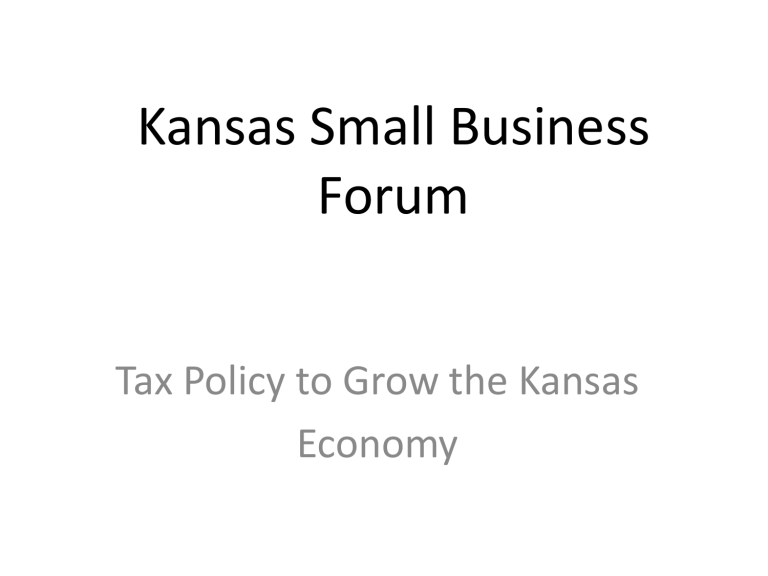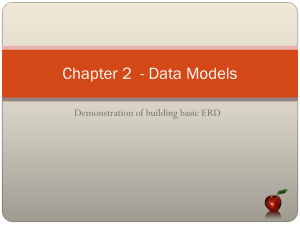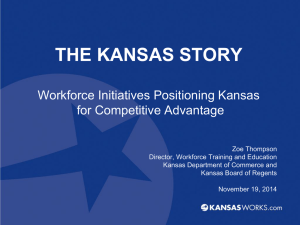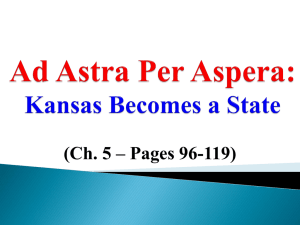Gary`s PowerPoint presentation.

Kansas Small Business
Forum
Tax Policy to Grow the Kansas
Economy
What the Governor Asked For
A FIELD
OF DREAMS
Build it and they will come
States With No Income Tax
Total Exemption
– Alaska
– Florida
– Nevada
– South Dakota
– Texas
– Washington
– Wyoming
Tax Dividends and Interest
– New Hampshire
– Tennessee
Joint Tax Committee Testimony
• Testified on Governor’s initiative on January
12, 2012
• My closing statement was:
– “The governor’s plan is bold and innovative. It deserves serious consideration.”
Overview of Governor’s Initiative
• Comparison of state top rates before and after
– Colorado
– Oklahoma
– Missouri
– Kansas
– Nebraska
4.63
5.25
6.00
4.63
5.25
6.00
6.45
4.95
6.84
6.84
Federal Consequences
NONE
Provisions of HB 2117
– Effective for tax year 2013 and thereafter
Provisions of HB 2117
– Lowers income tax brackets for married filing joint returns
• Not over $30,000
• Over $30,000
3%
$900 plus 4.9% of excess
Provisions of HB 2117
– Lowers income tax brackets for all other noncorporate taxpayers
• Not over $15,000
• Over $15,000
3%
$450 Plus 4.9% of excess
Provisions of HB 2117
– Standard deduction shall be
• Single
• Married, joint
• Head of household
$3,000
$9,000
$9,000
Provisions of HB 2117
Exemption of non-wage business income from Kansas taxation
Non-wage Business Income
• Net profit from business reported on Schedule C
• Net income from rental real estate, royalties, partnerships, S corporations, estates, trusts and net farm rental reported on Schedule E
• Net farm profit reported on Schedule F
Non-deductible Expenditures
• Self-employment taxes
• Contributions to pension and profit sharing plans
• Self-employed health insurance
• Domestic production activity deduction
Provisions of HB 2117
– A net operating loss shall only be available to corporations
Subchapter C Corporations
• Impact of the bill
– No changes made to C corporations or Kansas privilege tax on banks and savings institutions
• Computation of taxable income
• Rates
• Availability of credits
• LLC business income flowing to a C corporation continues to be subject to taxation
Subchapter C Corporations
– Retain C corporation status
– Elect subchapter S status
– Liquidate and reform as an LLC
Subchapter S Corporations
• Impact of bill
– Net profit reported on Schedule E is exempt from taxation
• Net losses reported on Schedule E are not deductible
• Salary received from an S corporation is taxable
Subchapter S Corporations
• Separately stated income and deductions retain their character for federal and Kansas purposes and will be taxable for Kansas purposes
– Dividends
– Interest
– Capital Gains
– 1231 Gains
LLC’s / Partnerships
• Impact of bill
– Net profit reported on Schedule E is exempt from taxation
• Net losses reported on Schedule E are not deductible
LLC’s / Partnerships
• Separately stated income and deductions retain their character for federal and Kansas purposes and will be taxable for Kansas purposes
– Dividends
– Interest
– Capital Gains
– 1231 Gains
• Guaranteed payments are reported on
Schedule E and are exempt from Kansas tax
Basis in S Corporations and LLC’s
– Basis in ownership interest is not increased by excluded income
– Distributions in excess of basis are taxable
Individuals
• Non-wage business income defined
• Net profit from business reported on Schedule C
• Net income from rental real estate, royalties, partnerships, S corporations, estates, trusts and net farm rental reported on Schedule E
• Net farm profit reported on Schedule F
Individuals
• Rental Properties
– Taxable income is excludable from Kansas AGI
– Taxable loss is non-deductible in determining
Kansas AGI
– Gain/loss on disposition of business property is a taxable event for Kansas purposes
• Basis in depreciable property is the same for federal and Kansas purposes
Individuals
Tax Situs of Business
• The bill does not distinguish between businesses operated in the state of Kansas vs. a foreign state.
• Residents of Kansas exclude income and deductions of ALL non-wage business income regardless of where the business is located.
Individuals
Employee vs. Independent Contractor
• Income from wages is NOT business income and is taxable
• Income earned by an independent contractor is business income and IS exempt from taxation
Kansas Economic Outlook
• Pay-for’s proposed by Governor Brownback that are not in the bill
– .6% sales tax permitted to expire
– Itemized deductions allowed in full
– Section 529 plan deduction remains
– Credits such as earned income credit, historic restoration credit and community service credits remain
Kansas Economic Outlook
• To balance the post 2012 state budget the revenue lost by enactment of the bill must be covered by
– Growth in the Kansas economy
– Growth in state population, resulting in
• Growth in sales and other tax collections (including income tax on increased work force)
– Controlled state spending
Illustration 1
Salaried Employee
Old Law
•
• Wage
Exemptions
$50,000
( 9,000)
• Standard deduction ( 6,000)
• Taxable income $35,000
• Kansas income tax $ 1,362
New Law
•
• Wage
Exemptions
$50,000
( 9,000)
• Standard deduction ( 9,000)
• Taxable income $32,000
• Kansas income tax $ 998
Illustration 2
Self-employed Individual
Old Law
•
• Business income
Exemptions
$50,000
( 9,000)
• Standard deduction ( 6,000)
• Taxable income
• Kansas tax
$35,000
$ 1,362
New Law
•
• Business income
Exemptions
$ -0-
( 9,000)
• Standard deduction ( 9,000)
• Taxable income
• Kansas tax
(18,000)
-0-
Illustration 3
Salaried with Rental Property Income
Old Law
• Wage
• Rental income
• Exemptions
$50,000
5,000
( 9,000)
• Standard deduction ( 6,000)
• Taxable income $40,000
• Kansas tax $ 1,675
New Law
• Wage
• Rental income
• Exemptions
$50,000
-0-
( 9,000)
• Standard deduction ( 9,000)
• Taxable income $32,000
• Kansas tax $ 998
Illustration 4
Salaried with Rental Property Loss
Old Law
• Wage
• Rental loss
• Exemptions
$50,000
( 5,000)
( 9,000)
• Standard deduction ( 6,000)
• Taxable income $30,000
• Kansas tax $ 1,050
New Law
• Wage
• Rental loss
• Exemptions
$50,000
-0-
( 9,000)
• Standard deduction ( 9,000)
• Taxable income $32,000
• Kansas tax $ 998
Illustration 5
Professional with Itemized Deductions
Old Law
• Wage $200,000
• Itemized deductions ( 25,000)
• Exemptions ( 9,000)
• Taxable income
• Kansas tax
$166,000
$ 9,762
New Law
• Wage $200,000
• Itemized deductions ( 25,000)
• Exemptions ( 9,000)
• Taxable income
• Kansas tax
$166,000
$ 7,564
Illustration 6
Salaried Professional with Business
Old Law
• Wage
• Business loss
$200,000
( 80,000)
• Exemptions ( 9,000)
• Itemized deductions ( 25,000)
• Taxable income $ 86,000
• Kansas tax $ 4,602
New Law
• Wage
• Business loss
• Exemptions
$200,000
-0-
( 9,000)
• Itemized deductions ( 25,000)
• Taxable income $166,000
• Kansas tax $ 7,564
Business Thought of the Day
If you conduct business in Missouri you will pay Missouri state income taxes
Business Thought of the Day
If you pay Missouri state income taxes you will have less capital available for your business
Business Thought of the Day
If you have less capital available for your business you increase the risk of incurring losses
Business Thought of the Day
If you incur too many losses you will go broke
Business Thought of the Day
Don’t go broke
Business Thought of the Day
Do your business in Kansas!!!
HB 2117
Q and A








